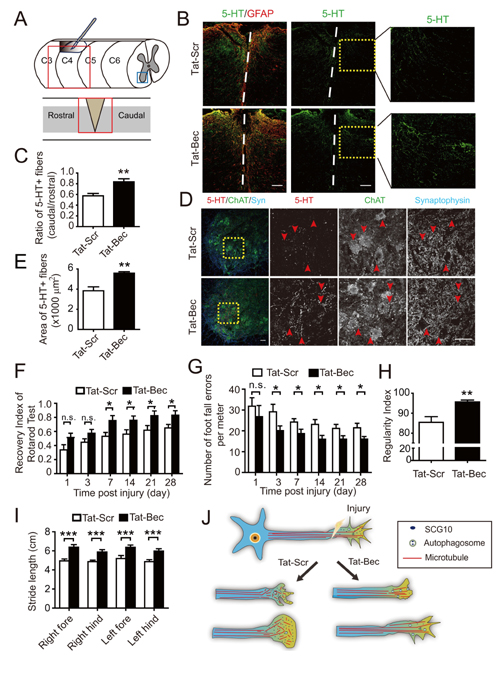Time:2016-09-18
The limited intrinsic axon growth capacity, the presence of extracellular inhibitory factors, and the lack of neurotrophic factors are major obstacles limiting regeneration of CNS axons after injury. However, manipulating individual proteins or combinations only allows limited axonal regeneration or sprouting and is usually associated with just temporary improvement in functional recovery. Furthermore, achieving axonal regeneration through manipulating certain genes still remains therapeutically unattainable. Thus, development of other effective approaches to promote axonal regeneration is still a challenging task.
Remodeling of cytoskeleton structures, such as microtubule assembly, is believed to be crucial for growth cone initiation and regrowth of injured axons. Autophagy plays important roles in maintaining cellular homoeostasis, and its dysfunction causes neuronal degeneration. The role of autophagy in axon regeneration after injury remains speculative.
Researchers from Dr. LUO Zhenge's lab at the Institute of Neuroscience, State Key Laboratory of Neuroscience, Center for Excellence in BrainScience and Intelligence Technology, CAS, demonstrate a role of autophagy in regulating microtubule dynamics and axon regeneration. They found that autophagy induction promoted neurite outgrowth, attenuated the inhibitory effects of nonpermissive substrate myelin, and decreased the formation of retraction bulbs following axonal injury in cultured cortical neurons.
Interestingly, autophagy induction stabilized microtubules by degrading SCG10, a microtubule disassembly protein in neurons. In mice with spinal cord injury, local administration of a specific autophagy-inducing peptide, Tat-beclin1, to lesion sites markedly attenuated axonal retraction of spinal dorsal column axons and cortical spinal tract and promoted regeneration of descending axons. Finally, administration of Tat-beclin1 improved the recovery of motor behaviors of injured mice. These results show a promising effect of an autophagy inducing reagent on injured axons, providing direct evidence supporting a beneficial role of autophagy in axon regeneration.
This work entitled "Autophagy induction stabilizes microtubules and promotes axon regeneration after spinal cord injury" was published online in PNAS on Sep. 16th. This study was mainly conducted by graduate student Miao He and Dr. Yuetong Ding under the supervision of Dr. LUO Zhenge and partially supported by grants from National Key Basic Research Program of China, National Natural Science Foundation of China, and the Strategic Priority Research Program of the Chinese Academy of Sciences. The intellectual property right related with this study has been patented prior to publication.

Tat-Bec promotes regeneration of descending axons and improves motor function recovery after spinal cord injury
 附件下载:
附件下载: